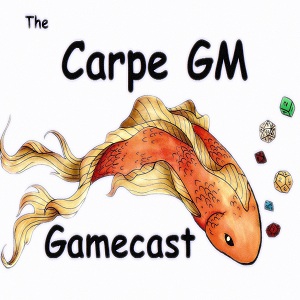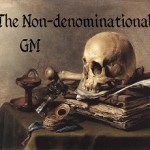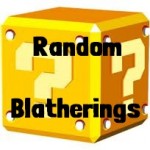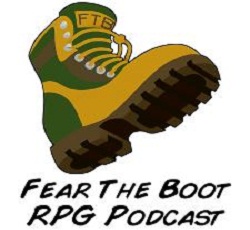With the growing popularity of RPG’s utilizing a virtual table top, This is BIG news! I received this press release yesterday and pass it on to you now…
|
|||
|
|||
|
With the growing popularity of RPG’s utilizing a virtual table top, This is BIG news! I received this press release yesterday and pass it on to you now…
|
|||
|
|||
|
Podcast (backwards-compatible): Play in new window | Download
Subscribe: RSS
Join Kyle, David, Aaron, and Penrod in this episode where we discuss the future of gaming; specifically where the industry is heading (for better or worse) and where we want to see it go.
But first Kyle remembers GiantBomb‘s Ryan Davis all the while leaving Penrod left for dead in XCOM, David and Aaron disagree and debate the quality of the new Deadpool game, and Penrod gives us the League of Legends hour. Plus! Did you know Minecraft now has horses? WOOT!
Theme Music is:
“Play the Game” by Pocketmaster
Break Music is:
Podcast: Play in new window | Download
Subscribe: RSS

Hosts – Dan, Mack, Steve, Bryan, Tyler
Topic – In this episode, the hosts explore the idea of character death, whether or not if it matters, and how it factors into our games, our game design, and what we do when it occurs.
Media –
RPG Circus | The Greatest Show In Gaming(Podcast)
NPC CAST | Your place for face to face games(Podcast)
Blizzard Entertainment:StarCraft II: Heart of the Swarm
New 52 Batman – Batman News
RPPR Actual Play | Role Playing Public Radio
The Death and Return of Superman – YouTube (NSFW)
Notes – I’ve checked them out, and NPC Cast not only exists, they’ve got a really good podcast! Make sure to check them out!
The music for this episode is provided by:
Captain Carl’s Tuesday Nite Blues Band
Find more from these wonderful musicians….
On Facebook
On ReverbNation

 In the past year or so, a new sort of wisdom has emerged amidst the community of modern game masters. Drawn from the root philosophy of improvisational entertainment and arguably a life-altering perspective that could forever change your relationship with your friends, your environment, and ultimately your gag reflex, the “yes, and…” mechanic is an inspiring idealogy comprised of “can-do” conventions and clever altruisms, coated in a mild veneer of sly wit and much winking of the eye. Whether it can improve your knitting, your sex life, or your dry cleaning bill is a matter best left to wiser men than I… but it can certainly improve your game. Dangerously so, in fact.
In the past year or so, a new sort of wisdom has emerged amidst the community of modern game masters. Drawn from the root philosophy of improvisational entertainment and arguably a life-altering perspective that could forever change your relationship with your friends, your environment, and ultimately your gag reflex, the “yes, and…” mechanic is an inspiring idealogy comprised of “can-do” conventions and clever altruisms, coated in a mild veneer of sly wit and much winking of the eye. Whether it can improve your knitting, your sex life, or your dry cleaning bill is a matter best left to wiser men than I… but it can certainly improve your game. Dangerously so, in fact.
Let’s posit an appropriately fictional scenario. Your brave and oh-so-clever party of intrepid adventurers are making their way through an old dwarven stronghold that has now been overrun by filthy goblinses. Putting aside the ridiculous presumption that a small army of goblins could infiltrate a well-defended stronghold of heavily inebriated dwarven regulars, you watch as your heroes gracefully stumble upon a nest of feasting humanoids in what was once the banquet hall. As the two groups manage to both reel in stupefied alarm at the suddenness of the encounter, your players start casting about for ideas that can restore the balance of power to their effectively outnumbered adventuring party.
“Filthy goblinses!” John says, in his best Dwarvish brogue. “GM, sir… could I slide under the table and surprise them all by lifting it up and throwing it?”
“Of course,” you reply blandly, “if you want to be stomped by six of the fiends on the way there.”
“GM, sir,” Sarah says. (Isn’t is nice how they call you sir?) “Are there any torches I could grab off the wall?”
“Goblinses need no torches,” you respond, offering Sarah a look of quiet sympathy. “They appear to have ripped all the sconces right off the wall.”
“GM, sir!” Richard exclaims. “I’d like to step forward and loudly proclaim, ‘You insolent fools! Do you realize what the Goblin King will say when he hears that you’ve been lounging about, drinking all the mead?! Stand up straight! Eyes forward! His Majesty approaches!”
You quirk an eyebrow. “Seriously…?” you exhale, reaching for your dice…
You may be thinking to yourself, “that’s it, GM sir… teach those presumptious know-it-alls a lesson in humility.” In which case, I’d like to kindly invite you to let each of your own brood take a turn GMing for you for a session or two and see how much you enjoy it. You might be surprised to learn that they’ve picked up a few of your more stingy and unforgiving traits. Not to say that the game can’t be fun… but let consider an alternative approach.
“Filthy goblinses!” John says, in his best Dwarvish brogue. “GM, sir… could I slide under the table and surprise them all by lifting it up and throwing it?”
“Of course!” you smile, “You slide past the lead goblinses before they even have a chance to pull up their wastebands and lock yourself into position for a mighty heave. You’ll need to avoid the teeth of a snarling goblindog, then make a strength check to heave the oaken table.”
“GM!” Sarah says, (forgetting the sir, but that’s alright) “I grab a torch off the wall and light in the fireplace!” You nod assertively, pointing over to Richard.
Richard ponders a moment. “I got it!” he says, striking a defiant pose and setting his features in a visage of terrible wrath. ‘You insolent fools! Do you realize what the Goblin King will say when he hears that you’ve been lounging about, drinking all the mead?! Stand up straight! Eyes forward! His Majesty approaches!”
You find yourself smiling along. “Make a bluff check,” you say, watching as Richard rolls an 8 out onto the ricketty card table; not really much of a success, even against goblinses. You offer them a level look. “They are so befuddled by the sudden torchlight and your exclamation that they are caught completey off guard as the dining room table explodes into the air, iron trenchers and goblets of fine mead flying in every direction. They reach for their weapons, but they are obviously unclear how many opponents there are which way to leap…”
In the second scenario, you’ll notice, you provided an empowering reaction to each of your players attempts at cleverness and heroism, without mitigating the challenges involved. Instead of feeling stumped at every turn and unable to do anything cool or interesting, the players felt energized and heroic, even in the face of poor die rolls. This is the “Yes, and…” philosophy at work. Rewarding your players for their engagement invests them in the scenario and makes it more fun to play. Believe it or not, a “Yes, and…” motif can even make tragic failures a powerful and engaging struggle for your players, and they will even accept character death or dishonor with a sense of dramatic panache. The key is to listen to what the players want and find a way to give it to them, adding a twist, condition, or challenge to the process. It’s easier than it sounds.
There is a precipice, however, that much be watched carefully. Permissive GMs can create a sense of entitlement in their players over time. And too much entitlement can create an expectancy in the players that will have dramatic and unpleasant results when you don’t give them what they want. It isn’t necessary (or even a good idea) to “Yes, and…” every challenge the heroes encounter. The story may wrap itself around the main protagonists, but the world doesn’t. Sometimes, there really are no torches on the walls. Or the goblinses just beheaded their king and offer only wicked smiles to Richard’s proclamation. As long as that sense of empowerment is there enough of the time to make the players excited about each new challenge, they are easily resilient enough to accept that sometimes life just doesn’t play by their rules.
You wanna walk along the precipice, not run over it to get away from murderous gamers.
Orryn Emrys, the Prismatic Dragon, is the director of the Prismatic Tsunami web community and the host of the popular Metagamers Anonymous RPG podcast. Learn more at http://www.prismatictsunami.com.


Metagamers Anonymous is a young podcast that I discovered while sifting for gold on iTunes. Lo and behold! I found it. These guys, and girl, are knowledgeable, well spoken, and creative. Their bi-weekly podcast has become one that I find myself waiting for.
A little while ago, I wrote them an e-mail, I’m posting it here for all to see…
In previous episodes, you’ve brought up the concept of “organic
roleplaying,”and, indeed, this seems to be a key principle in your own game
play. While this is a valuable tool around the game table to be sure, I feel
that “organic roleplaying” tends to reward those on the player’s side of the
screen more often than the GM.
Now, before you send me a “Dear listener, Please go [smurf] yourself” letter,
please allow me to explain.
Most of the time, players are experiencing the game world and all of it’s events
through the eyes one character. This means that every bit of role-playing
energy that the player puts into the game is being used to define the emotions,
attitudes, actions, and reactions of one individual, as opposed to the GM, who
is responsible for what goes on in the heads, hearts, and hands of everyone else
in the game world. Because of this, it’s more difficult for a GM to become as
deeply rooted in one character’s persona than it is for the players.
So what then, does a GM get out of a game with “organic roleplayers?…”
…The opportunity to take advantage of another gaming concept…”dynamic
storytelling.”
While a GM may be hard pressed to get down to the nuts and bolts
of every NPC’s emotion and motivation, he can use every descriptive tool at his
disposal to create a vibrant and immersive world around the PCs. The GM’s reward
for having good roleplayers is that he can tell a story and be confident that
his players will pull every but of excitement and fun out of any tale he tells.
It’s my point of view that, the more believable and dynamic the world and it’s
inhabitants, the more fulfilling the game.
That’s the concept that’s been bouncing around on the ping pong table of my mind
lately… player immersion. If immersion is the ball, then “dynamic
storytelling” and “organic roleplaying” are the paddles. It’s been my
experience that, while player immersion is a simple thing to define, it is not always
an easy thing to execute.
So here is my purely hypothetical question:
Which is more important to achieving player immersion, organic roleplay, or dynamic storytelling?
Once again, great show! Looking forward to the discussion.
The on-air responses and discussion can be found on Metagamers Anonymous Episode #7.
With the exception of their divulging of a weird furniture fetish, admitting to using Facebook in a manner in which, I’m sure, Mark Zuckerburg never intended, and something about a gazebo, the discussion went pretty much as I expected. Some tug o’ war occurred between the two sides, both with valid points. However, ultimately, I think they came to the same conclusion that I did….
RPGs take place, almost exclusively, through the cinematography of the minds eye. Therefore, a GM can “dynamically” tell a story until his lungs collapse, but, if he does not have receptive players, he may as well be reading them a grocery list. Conversely, a good organic player can allow his or her character take the wheel, steer, and role-play Tic-Tac-Toe if they set their mind to it.
But we’re talking about immersive role-playing. Throw out the dice and rules, and you get down to the quick of what our hobby is about…
playing make believe.
In the imagination of a child, it’s easy for a pencil to be a dragon-smiting holy sword, or a small patch of dirt in the backyard to transform into an arid wasteland that travelling heroes must cross to save the world. While a good GM can keep his players well stocked with pencils and dirt, he can’t give his players the sight to see them for what they really are. Only the child inside can make full use of such valuable tools. Children are, hands down, the most immersive gamers, even if they aren’t as refined and rules saavy. We were all there at one time. As role-players, most of us strive to reach, in our games, that point of full immersion we used to achieve so effortlessly as children. With that goal in mind, we’ve quantified every aspect of “make believe,” and in turn, those rules and the fiddly bits of whatever system we may be playing, can keep some of us rooted in the world in which we exist, while the immersive gamer soars in the world that they imagine.
It seems to me that player immersion exists with or without dynamic storytelling and organic role-playing, these concepts just help us achieve it by giving our inner 9 year old more things to play with.
With that bit of conjecture, I must go. But, you can all rest easy tonight, as I have recently purchased a new pencil sword and, as soon as I don my beach towel cloak, I’m off to save the world…..again.
– The Nondenominational GM
[cc_facebook_like]
Podcast: Play in new window | Download
Subscribe: RSS
Hosts – Dan, Bryan, Steve, Tyler, Mack, and a friend, Katelyn, joins us for some color commentary on this episode.
Topic – We discuss player immersion, and some ideas on ways to help achieve it from the GM’s and player’s perspective.
(1:00) What is immersion?
(3:00) Tips for the players
(15:39) “Meta”
(23:00) Tips and tricks for GMs
(43:30) A few of our own anecdotes on immersion
Media –
“What is the opposite of meta?”
Notes- Please log on to the forum and let us know what you think. We’d love to see you there!

 My step-son and I attended Fear the Con 5, hosted by Fear the Boot, which was a fantastic experience. We had not registered for any games but that community is one of the best in gaming, they made sure that we were involved in something entertaining during every block. I will delve into this experience a little deeper at a later date, however, I wanted to announce that their latest episode (Episode 266 – Vivid Storytelling) is posted. This episode was recorded live at the convention, and I was able make a comment on air about their topic…. Ok, so it’s more like being a scene extra than a cameo, but I’m still stoked!
My step-son and I attended Fear the Con 5, hosted by Fear the Boot, which was a fantastic experience. We had not registered for any games but that community is one of the best in gaming, they made sure that we were involved in something entertaining during every block. I will delve into this experience a little deeper at a later date, however, I wanted to announce that their latest episode (Episode 266 – Vivid Storytelling) is posted. This episode was recorded live at the convention, and I was able make a comment on air about their topic…. Ok, so it’s more like being a scene extra than a cameo, but I’m still stoked!
[cc_facebook_like]
Podcast: Play in new window | Download
Subscribe: RSS

Hosts – Dan, Bryan, Mack, Steve
Topic – A discussion about stereotypical villains and antagonists. We discuss what those stereotypes are, what makes a good villain, and ways to use them in your campaigns.
(1:24) A few villain stereotypes
(35:32) Our favorite antagonists that we’ve encountered as players
(43:46) Our favorite villains that we’ve ran as GMs
(53:41) Our favorite villains of any medium
Media –
Dragon Strike
Shadowrun
Vladimir Propp
DC Universe RPG (Wikipedia)
Mass Effect
Resident Evil (1996)(Wikipedia)
The Killing Joke (Wikipedia)
Magneto
Se7en
Lex Luthor
The Ring
Bio Shock (Wikipedia)
Silent Hill (Wikipedia)
F.E.A.R.
Left For Dead